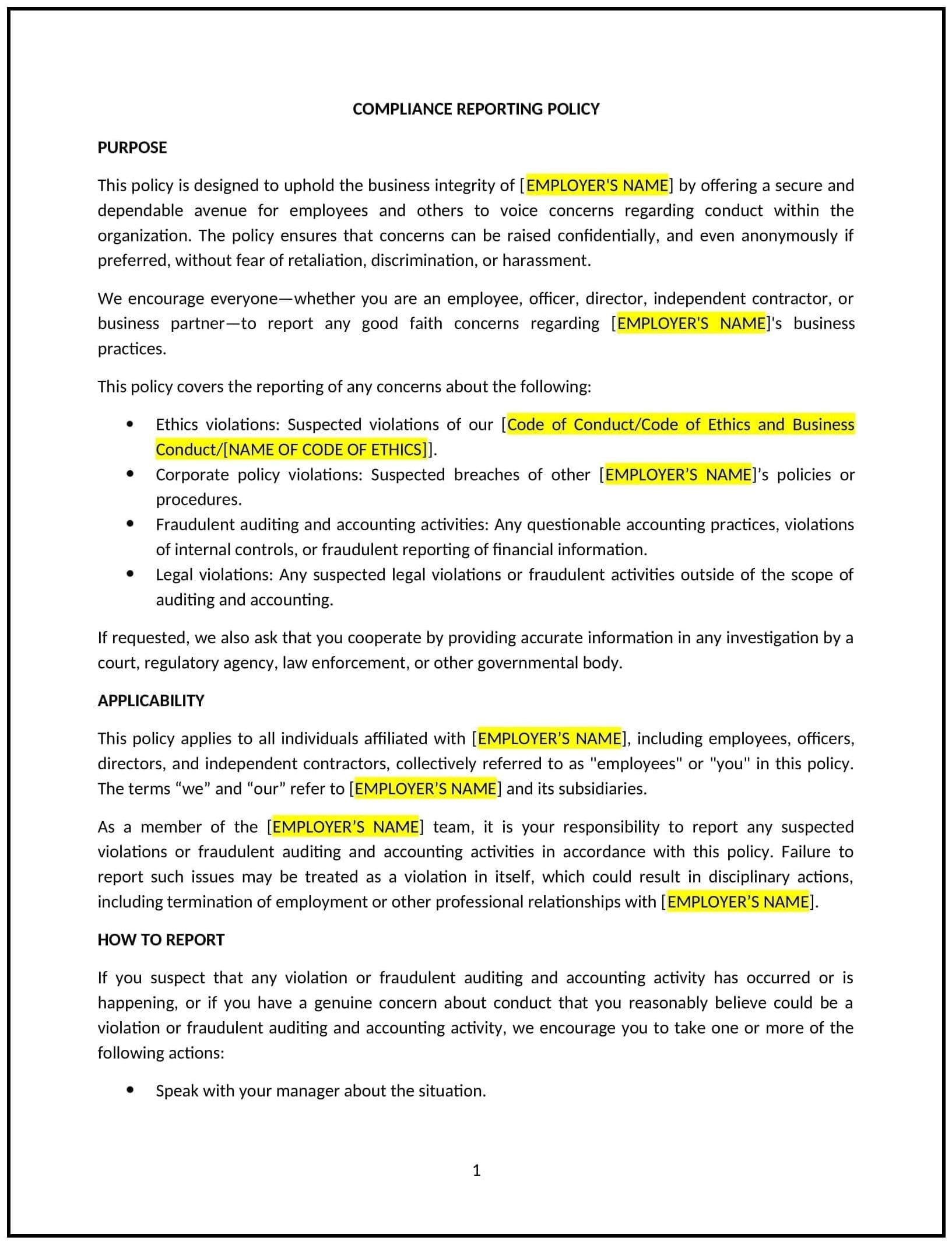Compliance reporting policy (New York): Free template
Got contracts to review? While you're here for policies, let Cobrief make contract review effortless—start your free review now.

Customize this template for free
Compliance reporting policy (New York)
A compliance reporting policy helps New York businesses establish clear procedures for employees to report any potential violations of laws, regulations, or company policies. This policy encourages employees to raise concerns about unethical or illegal activities without fear of retaliation. It outlines the reporting channels, confidentiality protections, and the process for investigating and addressing complaints. The policy is designed to promote a culture of transparency, accountability, and integrity while ensuring compliance with New York state and federal regulations.
By implementing this policy, businesses can proactively address compliance issues, reduce legal risks, and ensure a responsible, ethical workplace environment.
How to use this compliance reporting policy (New York)
- Define what constitutes a reportable violation: Clearly outline the types of misconduct or non-compliance that employees should report, including violations of laws, regulations, company policies, or unethical behavior.
- Establish reporting channels: Provide employees with multiple ways to report concerns, such as a dedicated hotline, online portal, or a designated compliance officer. Ensure that these channels are easily accessible and confidential.
- Ensure protection against retaliation: Clearly state that employees will not face retaliation for reporting violations. The policy should describe the protections in place to safeguard employees from adverse actions for making a good faith report.
- Define the investigation process: Outline the steps that will be taken when a report is made, including how complaints will be investigated, by whom, and the timeline for resolution. Ensure that investigations are conducted impartially and fairly.
- Promote confidentiality: Ensure that the identity of the employee reporting the violation is kept confidential, to the extent possible, to protect their privacy and encourage reporting.
- Ensure compliance with New York laws: Make sure that the policy complies with New York state laws and federal regulations, including whistleblower protections, and any industry-specific compliance requirements.
Benefits of using this compliance reporting policy (New York)
This policy offers several benefits for New York businesses:
- Encourages a transparent workplace: By providing clear procedures for reporting violations, businesses promote a culture of honesty and openness, where employees feel comfortable raising concerns.
- Reduces legal risks: The policy helps businesses detect and address potential legal or regulatory issues before they escalate into serious problems, reducing the likelihood of legal claims or penalties.
- Enhances accountability: The policy helps businesses ensure that all employees, including management, are held accountable for adhering to legal and ethical standards.
- Improves employee morale: When employees know that their concerns will be taken seriously and handled appropriately, it fosters trust and improves overall job satisfaction and morale.
- Strengthens the business’s reputation: A robust compliance reporting policy demonstrates a commitment to integrity and ethical behavior, improving the business’s reputation both internally and externally.
Tips for using this compliance reporting policy (New York)
- Communicate the policy clearly: Ensure that all employees understand the compliance reporting policy and know how to report concerns. This can be done during onboarding, in employee handbooks, and in periodic training sessions.
- Provide ongoing training: Regularly train employees on recognizing compliance issues, the reporting process, and the protections in place for whistleblowers. This helps to ensure that employees are informed and comfortable using the reporting channels.
- Monitor and track reports: Keep track of compliance reports and the outcomes of investigations to identify any recurring issues or trends that need to be addressed. This helps businesses stay proactive in managing compliance risks.
- Ensure confidentiality: Regularly remind employees that their identity will be protected when they report violations, to encourage more individuals to come forward without fear of retaliation.
- Review and update the policy regularly: Periodically review the compliance reporting policy to ensure it remains effective, up-to-date, and aligned with any changes in New York laws or industry-specific regulations.